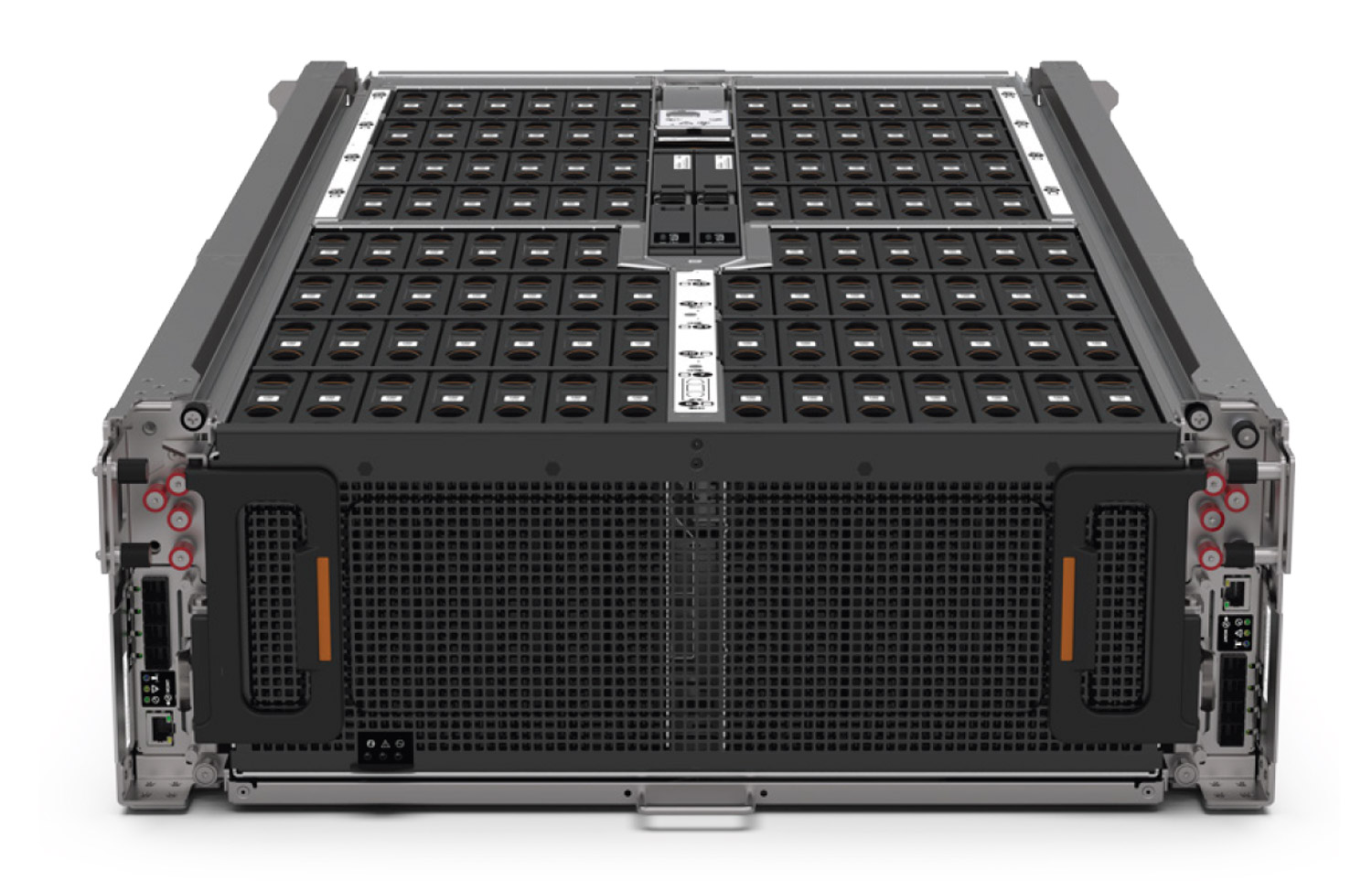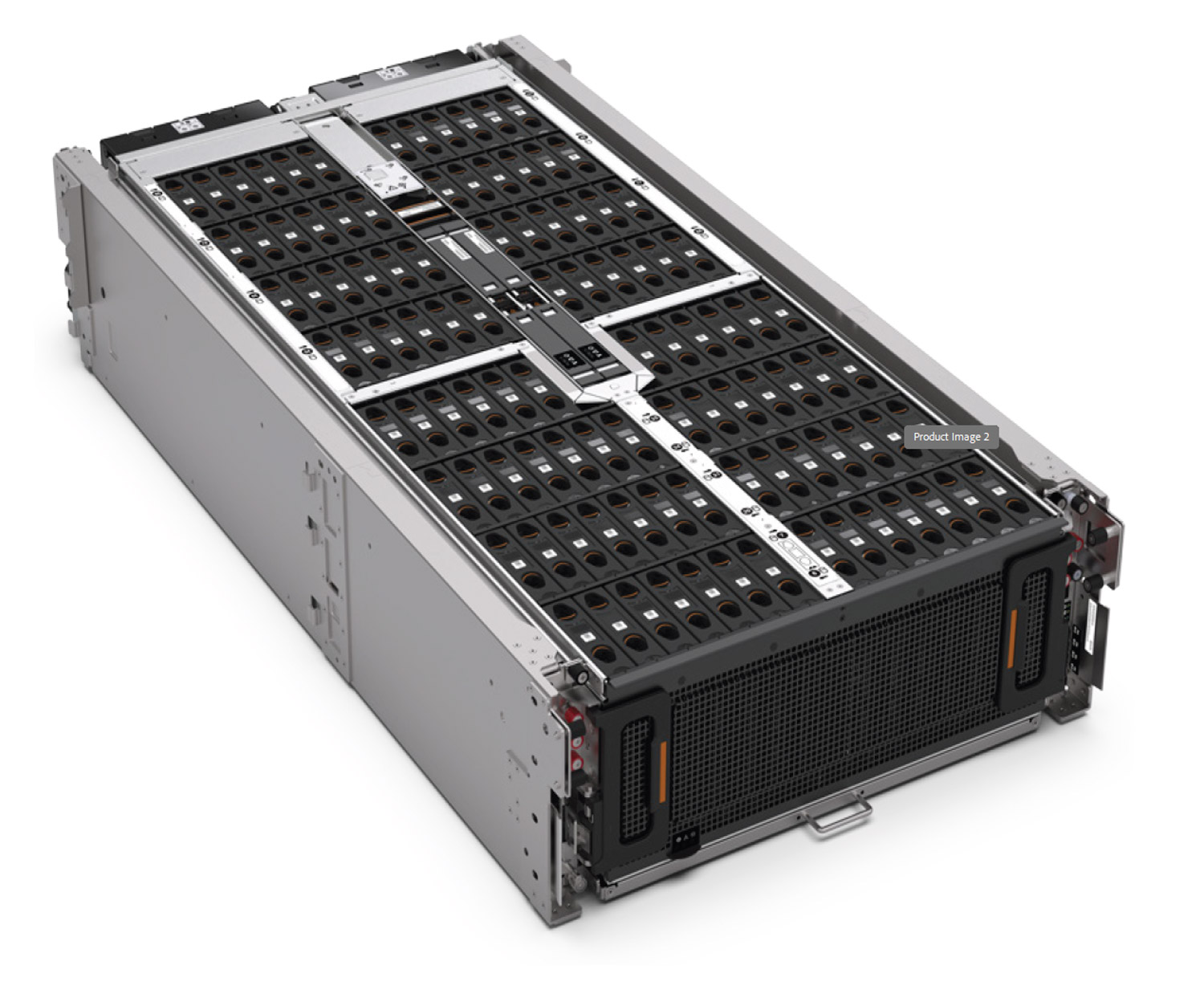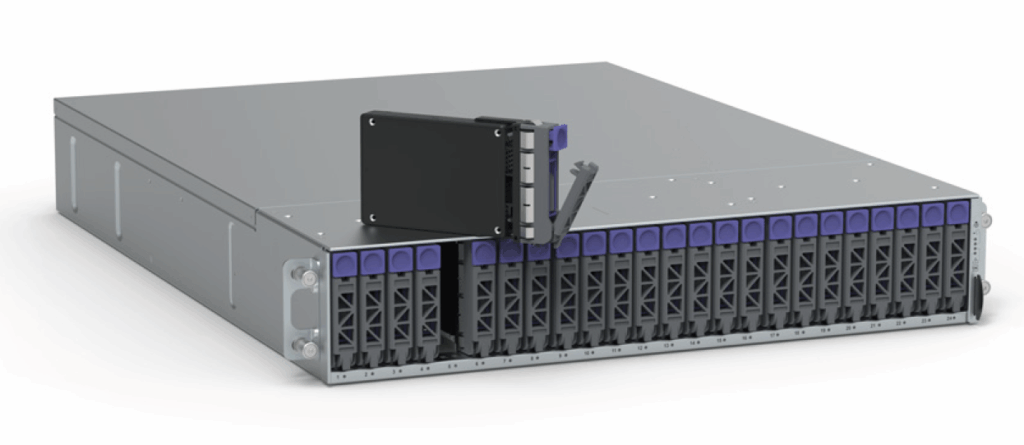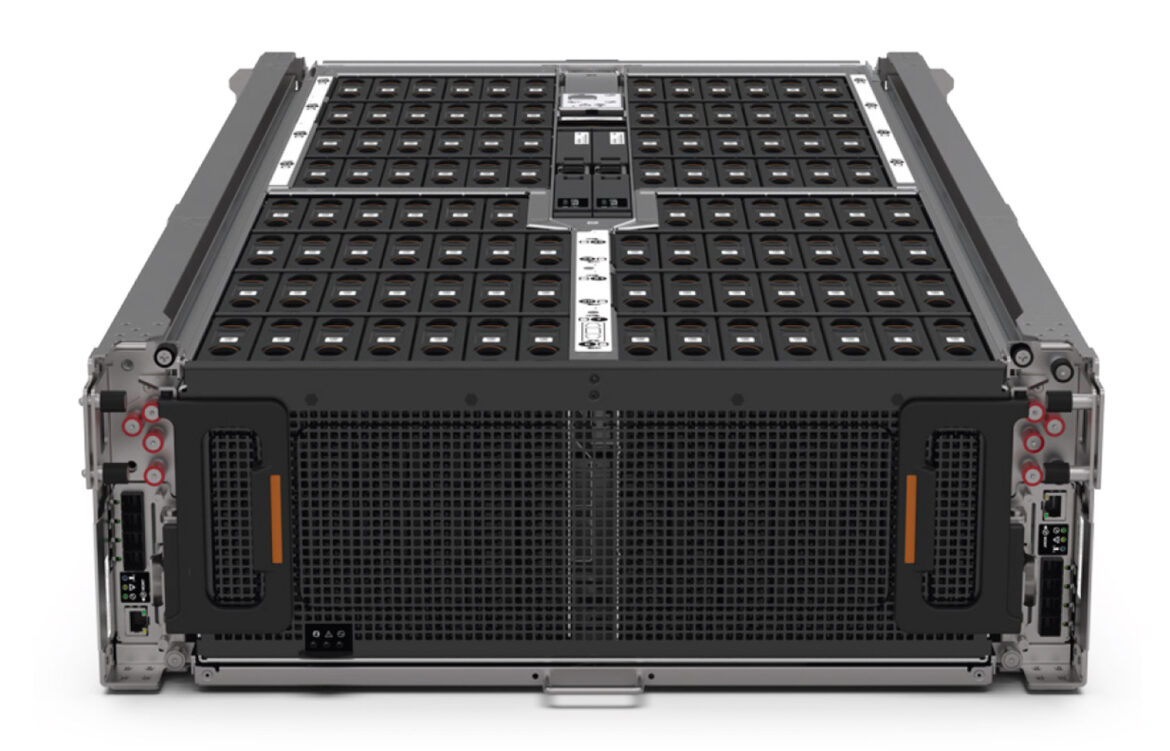Western Digital launches Ultrastar Data102 ORv3 and OpenFlex Data24 4000 to boost scalable HDD capacity and NVMe-oF performance.
Western Digital (WD) has introduced two new storage platforms to optimize cloud and enterprise data center operations: the Ultrastar Data102 3000 ORv3 and the OpenFlex Data24 4000 Series. Each platform brings a targeted set of features designed to improve density, efficiency, and manageability, whether through traditional high-capacity hard drive storage or high-speed NVMe flash in a disaggregated configuration.
Ultrastar Data102 3000 ORv3: High-Density HDD Storage for Cloud-Scale Deployments
The Ultrastar Data102 3000 ORv3 is WD’s latest entry in dense external storage platforms, specifically for cloud-scale environments. It was designed to meet the Open Compute Project’s (OCP) Open Rack v3 (ORv3) specifications, emphasizing energy efficiency, airflow optimization, and modularity. Its compliance with Rack Geometry Option 1 means better integration with modern rack configurations and improved serviceability.

At the system’s core is its ability to house up to 102 3.5-inch Ultrastar HDDs in a compact 4U chassis. The maximum raw capacity scales to 2.65PB when using 26TB conventional magnetic recording drives, making it a compelling option for organizations prioritizing capacity and scalability. The system is offered with SAS or SATA drive interfaces, providing deployment flexibility depending on performance and cost priorities.
The platform also benefits from Western Digital’s proprietary IsoVibe and ArcticFlow technologies. IsoVibe mitigates vibration across the chassis, often a source of performance degradation in dense drive arrays. This is achieved through baseboard cuts that isolate each drive, maintaining consistent operation under high workloads. ArcticFlow, on the other hand, addresses thermal challenges by routing cooler air directly into the middle of the chassis. This design supports thermal efficiency and contributes to quieter and more power-efficient operation.

Designed for shared HDD storage use cases, the platform is ideal for enterprise IT, storage OEMs, and cloud service providers. It includes eight 24Gb/s SAS-4 host connections and features hot-swappable enterprise-grade components (including I/O modules, host expanders, and cooling fans), streamlining maintenance and reducing potential downtime.
The system also integrates with Western Digital’s Resource Manager, a GUI-based tool for out-of-band platform management. This tool provides health metrics, configuration data, and system monitoring, helping IT teams maintain system integrity and respond proactively to issues.
| Ultrastar Data102 3000 ORv3 Storage Platform Specifications | |
| Max. Drives | 102 x 3.5 in. HDDs |
| Available Drive Capacities | Up to 26TB CMR |
| Drive Interface | 12Gb/s SAS, 6Gb/s SATA |
| Host Interface | 8x MiniSAS HD ports (4x per RDVR), 2x RJ45 OOBM ports (1x per RDVR) |
| Weight | Without drives: 50.6 kg / 111.5 lbs With 102 HDDs: 131.2 kg / 289.3 lbs |
| LED Indicators | System Front: Power, ID, Fault RDVR Front: SAS Link & Fault, Mgmt. Link & Activity |
| Physical Dimensions | Height: 174.5 mm / 6.87 in Width: 447 mm / 17.6 in (w/o rack adapters & shipping brackets) Depth: 1044.2 mm / 41.1 in |
| Management | SCSI Enclosure Services (In-Band) Redfish-based API (Out-of-Band, via RJ45) Resource Manager (Out-of-Band, via RJ45) |
| Power | 48V DC, 1600W PSU |
| Cooling | 4x Enclosure Fans (front-to-rear system cooling with zero-loss backflow prevention) Single I/O Module Fan Single PSU with built-in fan |
| Environmental | Operating Temperature: 5°C to 35°C Non-Operating Temperature: -40°C to 70°C Operating Relative Humidity: 5% to 85% Operating Altitude: -300m to 3048m / -984 ft to 10,000 ft |
| Serviceability | Hot-swappable IOMs, HEMs, RDVRs, Fans, and Drives |
OpenFlex Data24 4000 Series: Bridging Local NVMe Performance with Shared Storage Flexibility
With the Data24 4000 series, WD is looking to push the boundaries of shared storage by delivering NVMe performance over Ethernet fabrics. As part of the OpenFlex family, this storage platform uses NVMe-over-Fabrics (NVMe-oF) to enable multiple servers to access NVMe SSDs with latency and bandwidth characteristics closely resembling local storage. By leveraging its RapidFlex A2000 fabric bridge ASICs, the system achieves 12-port 100GbE connectivity that supports RDMA (RoCE) and TCP configurations, offering deployment flexibility for data centers.
The platform’s architecture is centered around disaggregation, allowing NVMe flash resources to be pooled and shared across multiple applications or hosts. This approach supports scalability and more efficient use of storage capacity, particularly as workloads evolve and require resource rebalancing. The Data24 4000 series comes in two versions: the 4100 model prioritizes high throughput without internal redundancy, while the 4200 introduces dual-port SSD support and redundant IOMs for high-availability environments.
Support for PCIe Gen4 throughout the chassis ensures no performance bottleneck between SSDs and the network, maintaining the integrity of high-speed data transfers. Both models support Open Composable API, aligning with modern composable infrastructure initiatives, and come with a 5-year limited warranty to underline long-term reliability.
The 4200 is intended to deliver robust performance across various workloads and targets enterprise use cases that necessitate resilience. Three RapidFlex A2000 ASICs and an efficient hardware design eliminate oversubscription and support consistent performance across connected hosts.
| OpenFlex Data24 4000 Series NVMe-oF Storage Platform | ||
| Enclosure Specifications | ||
| Form Factor | 2U | |
| Front Drive Bays | Up to 24 x U.2 NVMe SSDs | |
| Power Supply | 2x 800W Titanium 100–240VAC, CRPS, Hot Plug | |
| Fabric Adapter Slots | 12x 100 GbE ports | |
| Fabric Adapter(s) | Western Digital RapidFlex A2000 NVMe-oF Fabric Bridge ASICs | |
| Cabling | Passive (1–5m) and Active Optical (5m–20m) | |
| Platform Management | ARM Based BMC | |
| Rear I/O | 1G-BASE-T Management Port (RJ-45) | |
| HA Redundancy | Dual IOMs, PSUs, and N+2 fans | |
| Environmental | 10°C – 35°C | |
| Chassis Dimensions (H × W × D) | 85.5mm × 491.1mm × 628.65mm / 3.37in × 19.37in × 24.75in | |
| Weight | Maximum 18.25kg / 40.2lbs | |
| Warranty | 5 Years Limited Warranty | |
| Hardware Specifications | ||
| High-performance SSDs | Data24 4100: 24 Single port | Data24 4200: 24 Dual port |
| SSD Connectivity | 1 port with 4 lanes/port | 2 ports with 2 lanes/port |
| Capacity | Choose your NVMe SSD capacity and endurance options | |
| High Availability | N/A | Using dual redundant IOMs |
| NVMe-oF Fabric Bridge Devices / IOM | Three Western Digital RapidFlex A2000s | |
| OpenFlex inspired composability in a mainstream 2U24 | Supported | |
| Performance (Data24 4200) | ||
| Random Read (4KB) | RoCE: 27 MIOPs | TCP: 21 MIOPs |
| Random Write (4KB) | RoCE: 3 MIOPs | TCP: 3 MIOPs |
| Sequential Read (32KB) | RoCE: 135 GB/s | TCP: 113 GB/s |
| Sequential Write (128KB) | RoCE: 92 GB/s | TCP: 86 GB/s |
| Average Random Read Latency (4KB) | RoCE: 96.17 µs | TCP: 101.9 µs |
| Average Random Write Latency (4KB) | RoCE: 25.16 µs | TCP: 53.43 µs |
Enhanced Open Composable Compatibility Lab
Western Digital has also announced enhancements to its Open Composable Compatibility Lab (OCCL), which advance interoperability and innovation in fabric-attached devices and software-defined storage. Located in Colorado Springs, the OCCL serves as a vendor-neutral proving ground designed explicitly for cloud service providers (CSPs) and enterprise customers. The lab simulates real-world environments and workloads, offering critical insights into system compatibility, interoperability, energy efficiency, and performance optimization.
OCCL tests modern NVMe-oF architectures across disaggregated compute, storage, and networking, allowing customers to scale efficiently, lower costs, and deploy confidently.
OCCL 2.0: Key Enhancements
OCCL 2.0 introduces several new capabilities designed to help organizations maximize the value of composable, disaggregated infrastructure:
- Solution Architectures: The lab now generates detailed solutions, offering actionable guidance for deploying and managing composable disaggregated environments.
- Disaggregated Storage Best Practices: OCCL 2.0 highlights best practices to help organizations achieve greater efficiency and scalability in their storage deployments.
- Industry Expertise: The lab continues to serve as a source of thought leadership, sharing strategic insights and innovations in composable infrastructure.
- SSD Partner Benchmarking: Comprehensive benchmarking tools evaluate SSD partner performance, ensuring customers can access optimal storage solutions.
These advancements strengthen OCCL’s role as an industry leader, fostering partnerships and promoting open ecosystems over proprietary architectures.
Engage with StorageReview
Newsletter | YouTube | Podcast iTunes/Spotify | Instagram | Twitter | TikTok | RSS Feed

